现在完成时的用法解析
- 格式:doc
- 大小:66.50 KB
- 文档页数:18
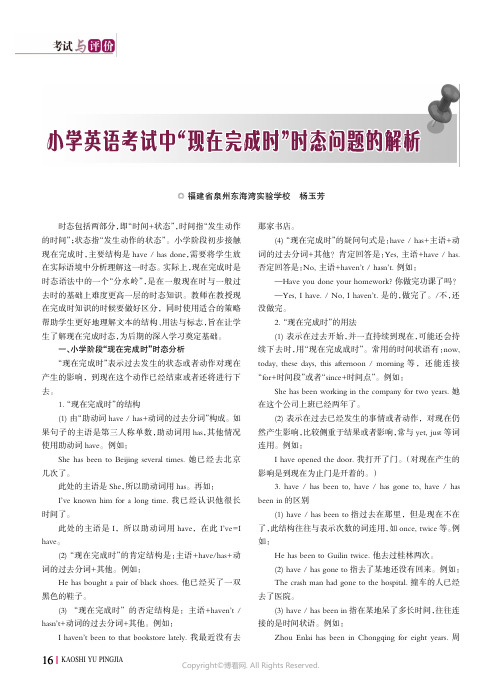
KAOSHI YUPINGJIA◎福建省泉州东海湾实验学校杨玉芳时态包括两部分,即“时间+状态”,时间指“发生动作的时间”;状态指“发生动作的状态”。
小学阶段初步接触现在完成时,主要结构是have /has done ,需要将学生放在实际语境中分析理解这一时态。
实际上,现在完成时是时态语法中的一个“分水岭”,是在一般现在时与一般过去时的基础上难度更高一层的时态知识。
教师在教授现在完成时知识的时候要做好区分,同时使用适合的策略帮助学生更好地理解文本的结构、用法与标志,旨在让学生了解现在完成时态,为后期的深入学习奠定基础。
一、小学阶段“现在完成时”时态分析“现在完成时”表示过去发生的状态或者动作对现在产生的影响,到现在这个动作已经结束或者还将进行下去。
1.“现在完成时”的结构(1)由“助动词have /has+动词的过去分词”构成。
如果句子的主语是第三人称单数,助动词用has ,其他情况使用助动词have 。
例如:She has been to Beijing several times.她已经去北京几次了。
此处的主语是She ,所以助动词用has 。
再如:I’ve known him for a long time.我已经认识他很长时间了。
此处的主语是I ,所以助动词用have ,在此I’ve=I have 。
(2)“现在完成时”的肯定结构是:主语+have/has+动词的过去分词+其他。
例如:He has bought a pair of black shoes.他已经买了一双黑色的鞋子。
(3)“现在完成时”的否定结构是:主语+haven’t /hasn’t+动词的过去分词+其他。
例如:I haven’t been to that bookstore lately.我最近没有去那家书店。
(4)“现在完成时”的疑问句式是:have /has+主语+动词的过去分词+其他?肯定回答是:Yes,主语+have /has.否定回答是:No,主语+haven’t /hasn’t.例如:—Have you done your homework?你做完功课了吗?—Yes,I have./No,I haven’t.是的,做完了。
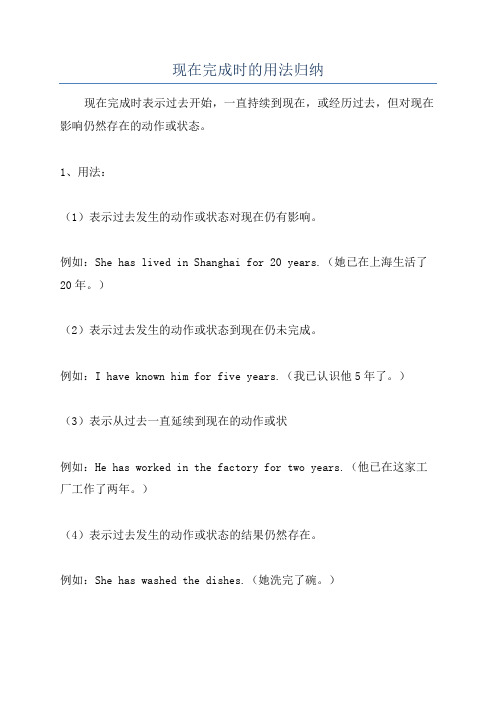
现在完成时的用法归纳
现在完成时表示过去开始,一直持续到现在,或经历过去,但对现在影响仍然存在的动作或状态。
1、用法:
(1)表示过去发生的动作或状态对现在仍有影响。
例如:She has lived in Shanghai for 20 years.(她已在上海生活了20年。
)
(2)表示过去发生的动作或状态到现在仍未完成。
例如:I have known him for five years.(我已认识他5年了。
)
(3)表示从过去一直延续到现在的动作或状
例如:He has worked in the factory for two years.(他已在这家工厂工作了两年。
)
(4)表示过去发生的动作或状态的结果仍然存在。
例如:She has washed the dishes.(她洗完了碗。
)。
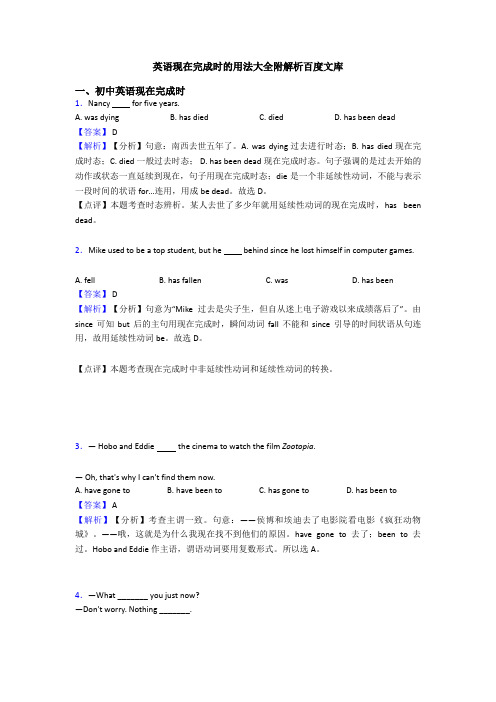
英语现在完成时的用法大全附解析百度文库一、初中英语现在完成时1.Nancy for five years.A. was dyingB. has diedC. diedD. has been dead【答案】 D【解析】【分析】句意:南西去世五年了。
A. was dying过去进行时态;B. has died现在完成时态;C. died一般过去时态; D. has been dead现在完成时态。
句子强调的是过去开始的动作或状态一直延续到现在,句子用现在完成时态;die是一个非延续性动词,不能与表示一段时间的状语for…连用,用成be dead。
故选D。
【点评】本题考查时态辨析。
某人去世了多少年就用延续性动词的现在完成时,has been dead。
2.Mike used to be a top student, but he behind since he lost himself in computer games.A. fellB. has fallenC. wasD. has been【答案】 D【解析】【分析】句意为“Mike过去是尖子生,但自从迷上电子游戏以来成绩落后了”。
由since可知but后的主句用现在完成时,瞬间动词fall不能和since引导的时间状语从句连用,故用延续性动词be。
故选D。
【点评】本题考查现在完成时中非延续性动词和延续性动词的转换。
3.— Hobo and Eddie the cinema to watch the film Zootopia.— Oh, that's why I can't find them now.A. have gone toB. have been toC. has gone toD. has been to【答案】 A【解析】【分析】考查主谓一致。
句意:——侯博和埃迪去了电影院看电影《疯狂动物城》。
——哦,这就是为什么我现在找不到他们的原因。

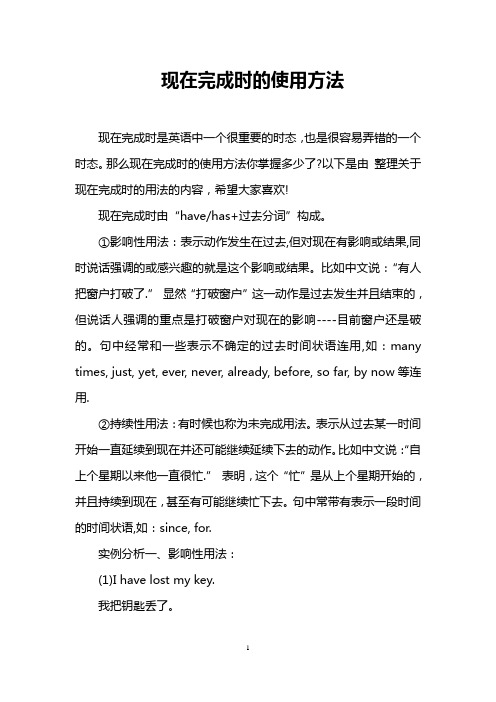
现在完成时的使用方法现在完成时是英语中一个很重要的时态,也是很容易弄错的一个时态。
那么现在完成时的使用方法你掌握多少了?以下是由整理关于现在完成时的用法的内容,希望大家喜欢!现在完成时由“have/has+过去分词”构成。
①影响性用法:表示动作发生在过去,但对现在有影响或结果,同时说话强调的或感兴趣的就是这个影响或结果。
比如中文说:“有人把窗户打破了.”显然“打破窗户”这一动作是过去发生并且结束的,但说话人强调的重点是打破窗户对现在的影响----目前窗户还是破的。
句中经常和一些表示不确定的过去时间状语连用,如:many times, just, yet, ever, never, already, before, so far, by now等连用.②持续性用法:有时候也称为未完成用法。
表示从过去某一时间开始一直延续到现在并还可能继续延续下去的动作。
比如中文说:“自上个星期以来他一直很忙.”表明,这个“忙”是从上个星期开始的,并且持续到现在,甚至有可能继续忙下去。
句中常带有表示一段时间的时间状语,如:since, for.实例分析一、影响性用法:(1)I have lost my key.我把钥匙丢了。
根据句意可知,“丢钥匙”这个动作发生在过去,同时也在过去已经完成。
但这个过去发生和完成的动作对现在有影响----导致我现然无法打开门,或者我要去找开锁匠帮助。
(2)We have finished the work.我们已经把工作干完了。
根据句意可知,这个“工作完成”的动作发生在过去,同时也在过去已经完成了,这个过去发生和完成的动作对现在的有影响----我们可以休息了,可以玩了,或者可以做其他事情了。
二、持续性用法:(1)Mr.Jack has lived in China since 2002.杰克自从2002年开始就一直住在中国。
根据句意可知,“住在中国”是从2002开始的,但它在过去没有完成,而是一直持续到现在,已经很多年了,甚至继续持续下去。

现在完成时Step 1 Lead in一般过去时导入:一般过去时的概念一般过去时表示过去某个时间发生的动作或存在的状态。
I lost my pen.(过去时)2. I have lost my pen.(现在完成时)过去时一般表示过去所发生的动作或存在的状态。
“我把笔丢了”,说话人只是想告诉对方在过去的某一个时间里他的笔丢了,仅此而已。
Step 2 new lesson一.现在完成时的构成:助动词have/has(not) +动词过去分词She has turned on the lights. (否定句,一般疑问句)肯定式:have/ has+过去分词否定式:haven’t/hasn’t+过去分词疑问式:把have/has 提到主语前面肯定回答:Yes,…..have/has否定回答:No,…..haven’t/hasn’t二.用法1。
表示过去发生的动作对现在造成的影响或结果,例如She has gone. 她走了. She went in the past.——She is not here now.I have just cleaned my hands.我刚洗过手。
(“洗手”是发生在过去的动作,对现在造成的结果是“手干净了”)I have closed the door. (The door is close now.)She has turned on the lights. (The lights are on now.)He has written his name on the blackboard. (The name is on the blackboard now.)Mother has cooked the dinner. (I haven’t got money now.)、Mother has cooked the dinner. (We can have dinner now.)You have seen the film. You know what the film is about.)We have cleaned the classroom. (The classroom is clean now.)2。

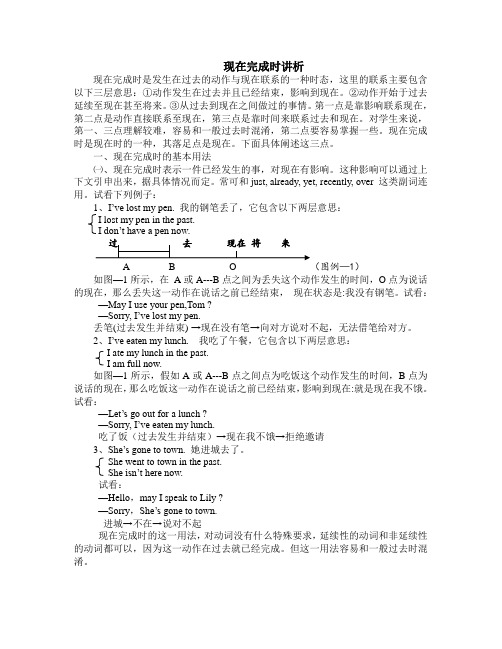
现在完成时讲析现在完成时是发生在过去的动作与现在联系的一种时态,这里的联系主要包含以下三层意思:①动作发生在过去并且已经结束,影响到现在。
②动作开始于过去延续至现在甚至将来。
③从过去到现在之间做过的事情。
第一点是靠影响联系现在,第二点是动作直接联系至现在,第三点是靠时间来联系过去和现在。
对学生来说,第一、三点理解较难,容易和一般过去时混淆,第二点要容易掌握一些。
现在完成时是现在时的一种,其落足点是现在。
下面具体阐述这三点。
一、现在完成时的基本用法㈠、现在完成时表示一件已经发生的事,对现在有影响。
这种影响可以通过上下文引申出来,据具体情况而定。
常可和just, already, yet, recently, over 这类副词连用。
试看下列例子:1、I’ve lost my pen. 我的钢笔丢了,它包含以下两层意思:I lost my pen in the past.I don’t have a pen now.A B O (图例—1)如图—1所示,在A或A---B点之间为丢失这个动作发生的时间,O点为说话的现在,那么丢失这一动作在说话之前已经结束,现在状态是:我没有钢笔。
试看:—May I use your pen,Tom ?—Sorry, I’ve lost my pen.丢笔(过去发生并结束) →现在没有笔→向对方说对不起,无法借笔给对方。
2、I’ve eaten my lunch.我吃了午餐,它包含以下两层意思:I ate my lunch in the past.I am full now.如图—1所示,假如A或A---B点之间点为吃饭这个动作发生的时间,B点为说话的现在,那么吃饭这一动作在说话之前已经结束,影响到现在:就是现在我不饿。
试看:—Let’s go out for a lunch ?—Sorry, I’ve eaten my lunch.吃了饭(过去发生并结束)→现在我不饿→拒绝邀请3、She’s gone to town. 她进城去了。
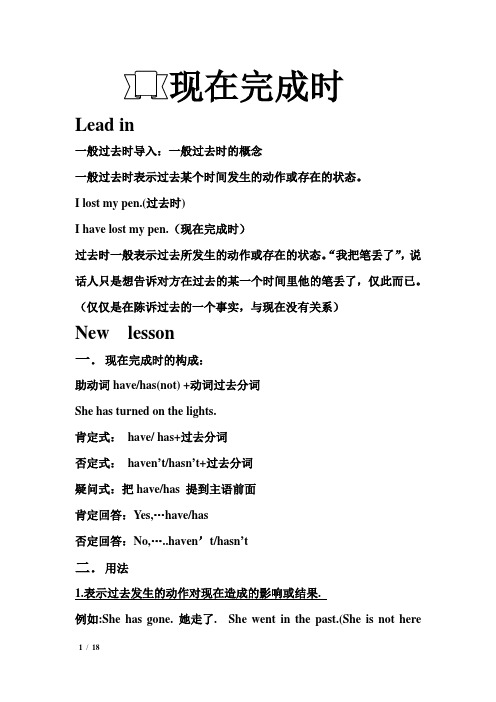
Lead in一般过去时导入:一般过去时的概念一般过去时表示过去某个时间发生的动作或存在的状态。
I lost my pen.(过去时)I have lost my pen.(现在完成时)过去时一般表示过去所发生的动作或存在的状态。
“我把笔丢了”,说话人只是想告诉对方在过去的某一个时间里他的笔丢了,仅此而已。
(仅仅是在陈诉过去的一个事实,与现在没有关系)New lesson一.现在完成时的构成:助动词have/has(not) +动词过去分词She has turned on the lights.肯定式:have/ has+过去分词否定式:haven’t/hasn’t+过去分词疑问式:把have/has 提到主语前面肯定回答:Yes,…have/has否定回答:No,…..haven’t/hasn’t二.用法1.表示过去发生的动作对现在造成的影响或结果.例如:She has gone. 她走了. She went in the past.(She is not herenow.)I have just cleaned my hands.我刚洗过手。
(“洗手”是发生在过去的动作,对现在造成的结果是“手干净了”)I have closed the door. (The door is close now.)She has turned on the lights. (The lights are on now.)He has written his name on the blackboard. (The name is on the blackboard now.)Mother has cooked the dinner. (We can have dinner now.)You have seen the film. (You know what the film is about.)We have cleaned the classroom. (The classroom is clean now.)2. 表示动作发生在过去,并且一直延续到现在,甚至还可能继续延续下去。
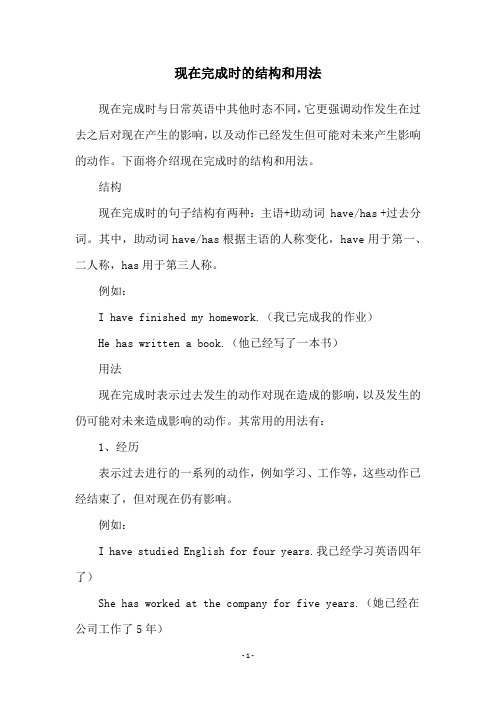
现在完成时的结构和用法现在完成时与日常英语中其他时态不同,它更强调动作发生在过去之后对现在产生的影响,以及动作已经发生但可能对未来产生影响的动作。
下面将介绍现在完成时的结构和用法。
结构现在完成时的句子结构有两种:主语+助动词 have/has +过去分词。
其中,助动词have/has根据主语的人称变化,have用于第一、二人称,has用于第三人称。
例如:I have finished my homework.(我已完成我的作业)He has written a book.(他已经写了一本书)用法现在完成时表示过去发生的动作对现在造成的影响,以及发生的仍可能对未来造成影响的动作。
其常用的用法有:1、经历表示过去进行的一系列的动作,例如学习、工作等,这些动作已经结束了,但对现在仍有影响。
例如:I have studied English for four years.我已经学习英语四年了)She has worked at the company for five years.(她已经在公司工作了5年)2、完成动作表示过去已经完成的动作,或是过去发生的动作对现在仍有影响。
例如:We have finished this project.(我们已经完成了这个项目) He has done a lot of work.(他做了很多工作)3、改变状态表示不仅发生了动作,还发生了状态的改变。
例如:She has become a teacher.(她已经成为了一名老师)He has grown up.(他已经长大了)4、近期发生的动作表示近期发生的动作,这些动作可能还没有完成,但已经发生。
例如:I have read four books this month.(这个月我已经读了四本书)She has been to Beijing.(她已经去过北京)现在完成时也可以和表示时间的状语连用,例如:just, already, already, yet, lately, recently等词,以加强句子的意义。
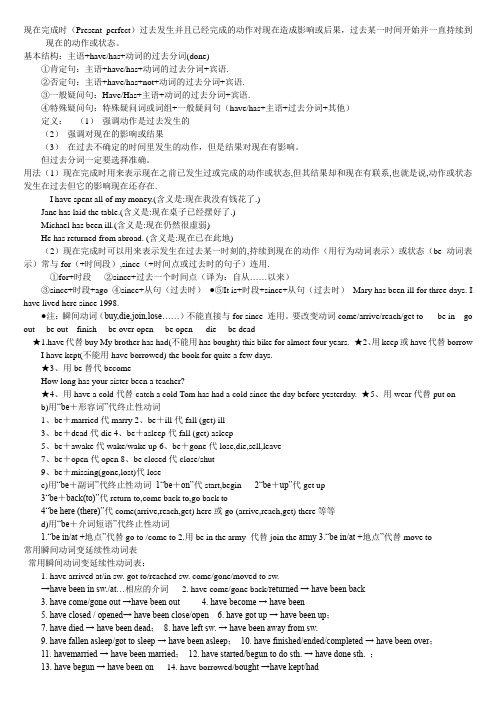
现在完成时(Present perfect)过去发生并且已经完成的动作对现在造成影响或后果,过去某一时间开始并一直持续到现在的动作或状态。
基本结构:主语+have/has+动词的过去分词(done)①肯定句:主语+have/has+动词的过去分词+宾语.②否定句:主语+have/has+not+动词的过去分词+宾语.③一般疑问句:Have/Has+主语+动词的过去分词+宾语.④特殊疑问句:特殊疑问词或词组+一般疑问句(have/has+主语+过去分词+其他)定义:(1)强调动作是过去发生的(2)强调对现在的影响或结果(3)在过去不确定的时间里发生的动作,但是结果对现在有影响。
但过去分词一定要选择准确。
用法(1)现在完成时用来表示现在之前已发生过或完成的动作或状态,但其结果却和现在有联系,也就是说,动作或状态发生在过去但它的影响现在还存在.I have spent all of my money.(含义是:现在我没有钱花了.)Jane has laid the table.(含义是:现在桌子已经摆好了.)Michael has been ill.(含义是:现在仍然很虚弱)He has returned from abroad. (含义是:现在已在此地)(2)现在完成时可以用来表示发生在过去某一时刻的,持续到现在的动作(用行为动词表示)或状态(be动词表示)常与for(+时间段),since(+时间点或过去时的句子)连用.①for+时段②since+过去一个时间点(译为:自从……以来)③since+时段+ago ④since+从句(过去时)●⑤It is+时段+since+从句(过去时)Mary has been ill for three days. I have lived here since 1998.●注:瞬间动词(buy,die,join,lose……)不能直接与for since 连用。

现在完成时用法归纳现在完成时(Present perfect)过去发生并且已经完成的动作对现在造成影响或后果,过去某一时间开始并一直持续到现在的动作或状态。
句型基本结构:主语+have/has+动词的过去分词(done)①肯定句:主语+have/has+动词的过去分词+宾语.②否定句:主语+have/has+not+动词的过去分词+宾语.③一般疑问句:Have/Has+主语+动词的过去分词+宾语.④特殊疑问句:特殊疑问词或词组+一般疑问句(have/has+主语+过去分词+其他)定义:(1)强调动作是过去发生的(2)强调对现在的影响或结果(3)在过去不确定的时间里发生的动作,但是结果对现在有影响。
但过去分词一定要选择准确。
[规则动词1 、规则动词:规则动词的过去分词的构成规则与规则动词的过去式的构成规则相同。
四点变化规则:(1)、一般动词,在词尾直接加“ ed ”。
work---worked---worked ,visit---visited---visited(2)、以“ e ”结尾的动词,只在词尾加“ d ”。
live---lived---lived ,(3)、以“辅音字母+ y ”结尾的动词,将"y" 变为"i" ,再加“ ed ”。
study---studied---studied ,cry---cried---cried(4)、重读闭音节结尾,末尾只有一个辅音字母,先双写该辅音字母,再加“ ed ”。
stop---stopped---stopped ,drop---dropped--dropped不规则动词2 、不规则动词:AAA型原型过去式过去分词burst burst burstcast cast castcost cost costcut cut cuthit hit hithurt hurt hurtput put putset set setshut shut shutspread spread spreadlet let letread read readled led ledAAB型beat beat beatenABA型become became becomerun ran runcome came come特殊情况read read readread原形发音为/ri:d/,过去式和过去分词发音为/red/ABB型bring brought broughtbuy bought boughtbuild built builtburn burnt burntcatch caught caughtdig dug dugfeel felt feltfight fought foughtfind found foundfeed fed fedget got gothang hung hunghear heard heardhold held heldkeep kept keptlay laid laidlead led ledlose lost lostleave left leftlend lent lentmake made mademean meant meantmeet met metpay paid paidsell sold soldshoot shot shotsay said saidsit sat satstand stood stoodshine shone shonesweep swept sweptsleep slept sleptteach taught taughttell told toldthink thought thoughtwin won wonABC型begin began begunblow blew blownbreak broke brokenchoose chose chosendraw drew drawndrive drove drivendrink drank drunkfly flew flownforgive forgave forgivenforget forgot forgottenfreeze froze frozengive gave givengrow grew grownknow knew knownride rode riddenrise rose risenring rang rungshake shook shakensing sang sungsink sank sunkswim swam swumthrow threw thrownwrite wrote written用法(1)现在完成时用来表示现在之前已发生过或完成的动作或状态,但其结果却和现在有联系,也就是说,动作或状态发生在过去但它的影响现在还存在.I have spent all of my money.(含义是:现在我没有钱花了.)Jane has laid the table.(含义是:现在桌子已经摆好了.) Michael has been ill.(含义是:现在仍然很虚弱)He has returned from abroad. (含义是:现在已在此地) (2)现在完成时可以用来表示发生在过去某一时刻的,持续到现在的动作(用行为动词表示)或状态(be 动词表示)常与for(+时间段),since(+时间点或过去时的句子)连用.①for+时段②since+过去一个时间点(译为:自从……以来)③since+时段+ago④since+从句(过去时)●⑤It is+时段+since+从句(过去时)Mary has been ill for three days.I have lived here since 1998.●注:瞬间动词(buy,di e,join,lose……)不能直接与for since 连用。

英语现在完成时的用法大全含解析一、初中英语现在完成时1.—How many letters you to your mother?—109 in all, since 2016.A. has, writtenB. have, writtenC. did, writeD. are, writing 【答案】 B【解析】【分析】句意:——你给你妈写了多少封信?——从2016年起,总共109封。
句中since 2016是现在完成时态常用的时间状语,其结构是主语+have/has+动词过去分词,且主语是you,则应填写have written,故答案选B。
【点评】考查动词的时态。
注意现在完成时的用法。
2.Mike used to be a top student, but he behind since he lost himself in computer games.A. fellB. has fallenC. wasD. has been【答案】 D【解析】【分析】句意为“Mike过去是尖子生,但自从迷上电子游戏以来成绩落后了”。
由since可知but后的主句用现在完成时,瞬间动词fall不能和since引导的时间状语从句连用,故用延续性动词be。
故选D。
【点评】本题考查现在完成时中非延续性动词和延续性动词的转换。
3.So far Tom with Mary _______ 50 left -behind children to do their homework after school.A. helpB. helpedC. has helpedD. have helped【答案】 C【解析】【分析】此题要掌握现在完成时的时间状语及主语+with 短语是单数的概念,即可得出答案。
选C。
4.—Your new bike is so nice! When did you buy it?—In July. I _____it for two weeks.A. hadB. have hadC. have boughtD. bought【答案】 B【解析】【分析】句意:——你的新自行车那么好看。
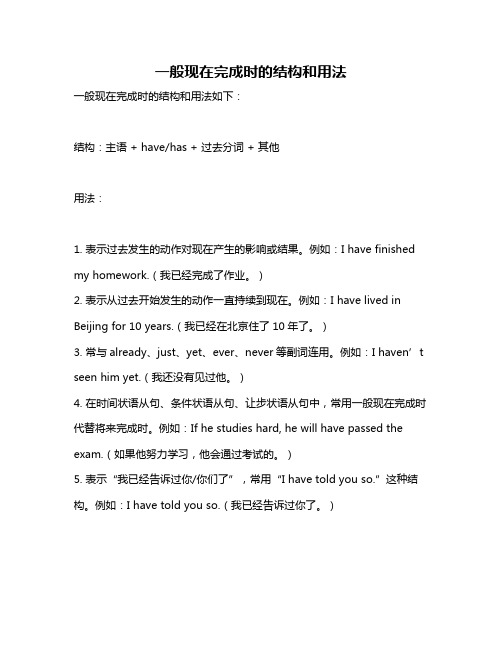
一般现在完成时的结构和用法一般现在完成时的结构和用法如下:结构:主语 + have/has + 过去分词 + 其他用法:1. 表示过去发生的动作对现在产生的影响或结果。
例如:I have finished my homework.(我已经完成了作业。
)2. 表示从过去开始发生的动作一直持续到现在。
例如:I have lived in Beijing for 10 years.(我已经在北京住了10年了。
)3. 常与already、just、yet、ever、never等副词连用。
例如:I haven’t seen him yet.(我还没有见过他。
)4. 在时间状语从句、条件状语从句、让步状语从句中,常用一般现在完成时代替将来完成时。
例如:If he studies hard, he will have passed the exam.(如果他努力学习,他会通过考试的。
)5. 表示“我已经告诉过你/你们了”,常用“I have told you so.”这种结构。
例如:I have told you so.(我已经告诉过你了。
)6. 在“It is the first/second time that+句子”中,从句常用现在完成时。
例如:It is the first time that I have seen this movie.(这是我第一次看这部电影。
)7. 在“It won’t be the first/second time that+句子”中,从句也常用现在完成时。
例如:It won’t be the first time that he has cheated in the exam.(这不会是他第一次在考试中作弊。
)以上是一般现在完成时的结构和用法,希望能对您有所帮助!。
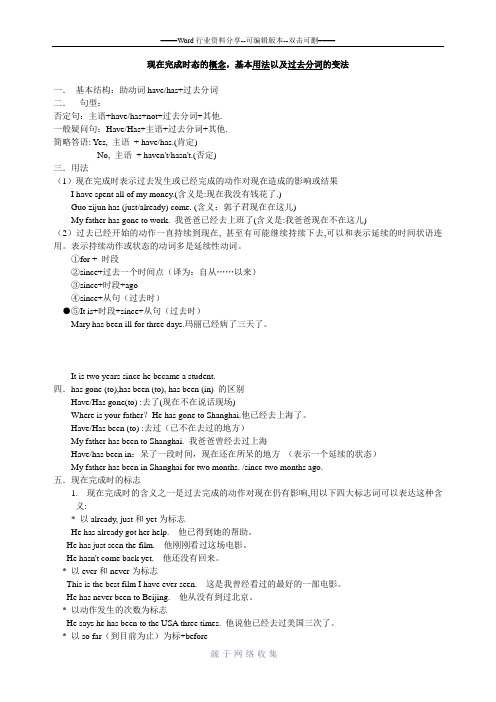
现在完成时态的概念,基本用法以及过去分词的变法一.基本结构:助动词have/has+过去分词二.句型:否定句:主语+have/has+not+过去分词+其他.一般疑问句:Have/Has+主语+过去分词+其他.简略答语: Yes, 主语+ have/has.(肯定)No, 主语+ haven't/hasn't.(否定)三.用法(1)现在完成时表示过去发生或已经完成的动作对现在造成的影响或结果I have spent all of my money.(含义是:现在我没有钱花了.)Guo zijun has (just/already) come. (含义:郭子君现在在这儿)My father has gone to work. 我爸爸已经去上班了(含义是:我爸爸现在不在这儿)(2)过去已经开始的动作一直持续到现在, 甚至有可能继续持续下去,可以和表示延续的时间状语连用。
表示持续动作或状态的动词多是延续性动词。
①for + 时段②since+过去一个时间点(译为:自从……以来)③since+时段+ago④since+从句(过去时)●⑤It is+时段+since+从句(过去时)Mary has been ill for three days.玛丽已经病了三天了。
It is two years since he became a student.四.has gone (to),has been (to), has been (in) 的区别Have/Has gone(to) :去了(现在不在说话现场)Where is your father?He has gone to Shanghai.他已经去上海了。
Have/Has been (to) :去过(已不在去过的地方)My father has been to Shanghai. 我爸爸曾经去过上海Have/has been in:呆了一段时间,现在还在所呆的地方(表示一个延续的状态)My father has been in Shanghai for two months. /since two months ago.五.现在完成时的标志1.现在完成时的含义之一是过去完成的动作对现在仍有影响,用以下四大标志词可以表达这种含义:* 以already, just和yet为标志He has already got her help.他已得到她的帮助。

现在完成时用法解析1.构成现在完成时是由助动词 have(has)+动词的过去分词构成。
助动词说明该谓语是属于现在时范围。
它和主语的人称、数要保持一致。
过去分词是主要的谓语动词,说明句子的意义。
2.用法(1)表示动作发生在过去某个不确定的时间,但对现在留下了某种影响和结果。
常被just、already、yet 等副词修饰。
如:-Have you had lunch yet? -Yes,I have. I've just had it.你(已经)吃午饭了吗?我刚刚吃过。
(现在我不饿了)(2)表示从过去某一时刻开始一直持续到现在的动作或状态。
这个动作可能刚停止,可能仍然在进行。
常带有for和since等表示一段时间的状语。
如:He has taught here since 1981他自1981年就在这儿教书。
(可能还要继续教)I have't seen her for four years.我有四年没见到她了。
(3)表示说话前发生过一次或多次的动作,现在成为一种经验,一般译为汉语“过”,常带有twice,ever,never,three times等时间状语。
如: I have been to Beijing twice.我去过北京二次。
3.现在完成时的时间状语(1)现在完成时属于现在时范围,故不能和过去的时间状语连用。
如:yesterday,last Sunday,in1990,three years ago等。
但是,在强调动作产生的后果和影响时,可以和一些表示不确定的时间状语连用。
a. 用副词already和yet。
already一般用于肯定句中,yet一般用于否定句和疑问句中。
如:We have already finished our homework.我们已完成作业了。
They haven't finished their homework yet.他们还没有完成作业。
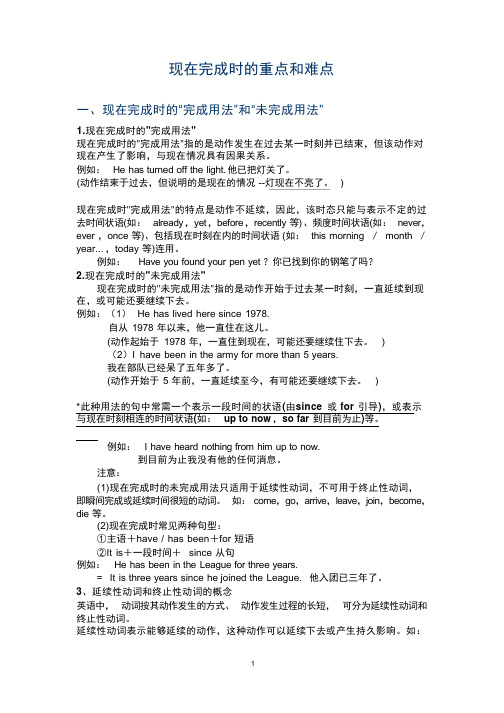
现在完成时的重点和难点一、现在完成时的“完成用法”和“未完成用法”1.现在完成时的"完成用法"现在完成时的"完成用法"指的是动作发生在过去某一时刻并已结束,但该动作对现在产生了影响,与现在情况具有因果关系。
例如:He has turned off the light. 他已把灯关了。
(动作结束于过去,但说明的是现在的情况--灯现在不亮了。
)现在完成时"完成用法"的特点是动作不延续,因此,该时态只能与表示不定的过去时间状语(如:already ,yet ,before ,recently 等) 、频度时间状语(如:never,ever ,once 等)、包括现在时刻在内的时间状语(如:this morning /month /year... ,today 等)连用。
例如:Have you found your pen yet ?你已找到你的钢笔了吗?2.现在完成时的"未完成用法"现在完成时的"未完成用法"指的是动作开始于过去某一时刻,一直延续到现在,或可能还要继续下去。
例如:(1)He has lived here since 1978.自从1978 年以来,他一直住在这儿。
(动作起始于1978 年,一直住到现在,可能还要继续住下去。
)(2)I have been in the army for more than 5 years.我在部队已经呆了五年多了。
(动作开始于5 年前,一直延续至今,有可能还要继续下去。
)*此种用法的句中常需一个表示一段时间的状语(由since或for引导),或表示与现在时刻相连的时间状语(如:up to now,so far到目前为止)等。
例如:I have heard nothing from him up to now.到目前为止我没有他的任何消息。
注意:(1)现在完成时的未完成用法只适用于延续性动词,不可用于终止性动词,即瞬间完成或延续时间很短的动词。
Lead in一般过去时导入:一般过去时的概念一般过去时表示过去某个时间发生的动作或存在的状态。
I lost my pen.(过去时)I have lost my pen.(现在完成时)过去时一般表示过去所发生的动作或存在的状态。
“我把笔丢了”,说话人只是想告诉对方在过去的某一个时间里他的笔丢了,仅此而已。
(仅仅是在陈诉过去的一个事实,与现在没有关系)New lesson一.现在完成时的构成:助动词have/has(not) +动词过去分词She has turned on the lights.肯定式:have/ has+过去分词否定式:haven’t/hasn’t+过去分词疑问式:把have/has 提到主语前面肯定回答:Yes,…have/has否定回答:No,…..haven’t/hasn’t二.用法1.表示过去发生的动作对现在造成的影响或结果.例如:She has gone. 她走了. She went in the past.(She is not herenow.)I have just cleaned my hands.我刚洗过手。
(“洗手”是发生在过去的动作,对现在造成的结果是“手干净了”)I have closed the door. (The door is close now.)She has turned on the lights. (The lights are on now.)He has written his name on the blackboard. (The name is on the blackboard now.)Mother has cooked the dinner. (We can have dinner now.)You have seen the film. (You know what the film is about.)We have cleaned the classroom. (The classroom is clean now.)2. 表示动作发生在过去,并且一直延续到现在,甚至还可能继续延续下去。
这时常和since所引导的短语或从句或for引导的短语连用(for有时可以省去)。
以及so far, by now, these days, in the last/past … years/days…等连用。
I have lived here for over ten years. (表示他现在还在这里居住,并且还有可能继续住下去)比较:I lived here ten years ago.(仅仅说明了他十年前在这里记住过的事实,不代表现在他还住在这里)He has studied here since 2006.都用How long 提问,例:We have learned English for three years.We have learned English since three years ago.-How long have you learned English?They have written 15 songs so far.Mr. Green has been in China these years.附:have been 与have gone 的用法比较1:“have been +in+地点名词”或“have been + 位置副词”的意思是“在某地呆过(多久)”.如:Mr. Green has been in China for many years. 格林先生在中国呆过好多年。
I have been here since I began to work. 我工作以来一直呆在这儿。
2:“have been + to +地点名词”或“have been+ 位置副词”意思是“曾经到过某地(多少次),已经到了某地”。
如:Miss Brown has been to Japan twice. 布朗小姐到日本去过两次。
Have you ever been here before? 你以前到过这吗?I have been to Xiamen.(我曾经去过厦门)3: “have gone to + 地点名词”或“have gone + 副词”意思是“在去某地的路上,还没有到”I have gone to Xiamen.(我已经在去厦门的路上了.)三.现在完成时句中常见的时间状语(一). just, already, yet, ever, never,before ,recently有此类副词时, 常强调动作完成, 不强调动作的持续.She has never /just/ already /ever eaten a Mango.He has ___just/ already______ come.I have finished your homework already.Have you milked the cow yet?He has not come yet.We have seen the movie before,我们以前看过这个电影其中just用于肯定句, 意为“刚刚”,already用于肯定句, 意为“已经”,yet用在疑问句中也意为“已经”,ever用于一般疑问句,意为“曾今”。
1.already意为“已经”,通常用于肯定句中,可放在助动词之后,过去分词之前,也可以放在句末。
实例:1)I've already read this book. 我已经读过这本书了。
(“读”这一动作发生在过去,对现在造成的影响是“知道书中的内容”。
)2)I've washed my clothes already.我已经洗了衣服。
(洗衣服的动作已完成,其结果是“衣服冼干净了”。
)注意:在表示吃惊或明知故问等感情色彩时,already也可用于(口语)疑问句中。
实例:3)Have you met him already ?你(真的)已经见过他了?2.yet用在疑问句中意为“已经”,用在否定句中意为“还”,常放在句末。
实例:1)—Has he found his watch yet ?他已经找到他的手表了吗?—No,not yet.不,还没有。
2)The woman hasn't found her dog yet .那位妇女还没有找到她的狗。
(没找到狗,心里着急,这就是对现在的影响)3.just意为“刚刚”,表示行为刚刚过去,常放在助动词与过去分词之间。
实例:He has just come back from school .他刚从学校回来。
注意just now 用于过去时4.ever意为“曾经”,用于疑问句或否定句中,放在助动词与过去分词之间。
实例:1)Have you ever been to Hong Kong ?你曾去过香港吗?2)I haven't ever spoken to her.我未曾和她说过话。
5.never意为“从来没有”常与before连用(before要放在句尾,而never多放在助动词与过去分词之间。
实例:I have never travelled by plane before.我以前从来没有乘飞机旅行过。
6.before意为“以前”,指过去不确定的某个时间,总是放在句末,不受句型的限制。
实例:1)Have you been to Hainan before ?你以前去过海南吗?2)I haven't eaten Guangdong food before.我以前没吃过广东菜(二)表示从过去一直持续到现在, 要用表示一段时间的时间状语来强调动作的持续,不能是具体过去时间。
for + 时间段如: for ten yearssince + 时间点如: since nine o’clocksince + 时间段+ ago 如: since ten years agosince + clause 主句现在完成时,从句一般过去时.如: since you came since you got home(三)现在完成时不能和明确表示过去的时间连用.如:yesterday / last year / two years ago / in 1999 / just now / on Sunday / on April Fool’s Day …四.一般过去时和现在完成时的区别1)一般过去时表示过去某时发生的动作或单纯叙述过去的事情,强调动作;现在完成时为过去发生的,强调过去的事情对现在的影响,强调的是影响。
2)过去时常与具体的时间状语连用,而现在完成时通常与模糊的时间状语连用,或无时间状语。
(1)一般过去时的时间状语:yesterday, last week,…ago, in1980, in October, just now, 具体的时间状语(2)现在完成时的时间状语For + …, since + …, so far , up to/till now, ever, never, just, yet, till / until, in past years, always,(3)共同的时间状语this morning, tonight ,this April, now, once,before, already, recently,lately(4)不确定的时间状语3)现在完成时可表示持续到现在的动作或状态,动词一般是延续性的.如live, teach, learn, work, study, know.一般过去时常用的非持续性动词有come, go, leave, start, die, finish, become, get married等。
举例:I saw this film yesterday.(强调看的动作发生过了。
)I have seen this film.(强调对现在的影响,电影的内容已经知道了。
)Why did you get up so early?(强调起床的动作已发生过了。
)Who hasn't handed in his paper?(强调有卷子,可能为不公平竞争。
)She has returned from Paris.她已从巴黎回来了。
She returned yesterday.她是昨天回来了。
He has been in the League for three years.(在团内的状态可延续)He has been a League member for three years.(是团员的状态可持续)He joined the League three years ago.( 三年前入团,joined为短暂行为。